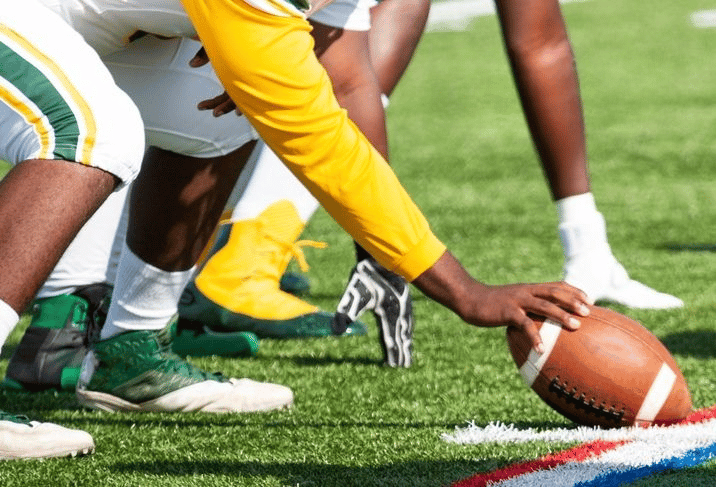Football is known for being a rough contact support. Even large amounts of padding can’t protect these players from gruesome tackles, concussions, and some serious bruises. Although the big hits may be fun to watch on our tv screens, the pain for the players is real.
NFL Players & Painkiller Abuse
Because of the frequency and severity of injuries in the game, over-the-counter painkillers often won’t do. Instead, professional football players are turning to strong prescription opioids and taking them regularly. Over half of former NFL players in a survey admitted to using prescription opioids during their playing career, and of those half, 71% admitted to misusing these drugs.1 There are likely several reasons for such high numbers of NFL painkiller use. Some players are using these drugs to continue to play through the pain and stay out on the field regardless of injury. Whether it is for pride, big paychecks, or fear of losing their job, painkillers may be the short-term answer to these problems. In other cases, the relationship between the NFL and opioids may be part of the problem. In regards to access to painkillers in the NFL, retired player Calvin Johnson says that before more recent inspection of the National Football League, “…the doctors, the team doctors and trainers they were giving them out like candy, you know?”2 Also, 63% of retired players who did use prescription opioids during their careers admitted to getting them from someone other than a doctor. The culprits were teammates, coaches, and trainers but also included family members, dealers, or the internet.1 Regardless of how it came about, misuse of painkillers in the NFL has led to a tailspin of problems for some including dependency, addiction, and more. In some cases, these problems arose during some players’ otherwise successful careers. Hall of Famer, Brett Farve, for example, may have been making a name for himself as a star quarterback, but off the field, he was struggling with addiction. He admits to popping 14 Vicodin a time during one of the same seasons he won the Most Valuable Player Award, and also went to drug rehab three times during his career for opioids and alcohol.3 Although Favre was able to get clean while still playing the game, many are not so lucky.
No Pain, Short-Term Gain, Long-Term Troubles
Some of the biggest problems with NFL painkiller abuse are the long-term consequences. One study found that retired NFL players abuse painkillers at four times the rate of the average person with 52% admitting to using them and 71% meeting criteria for misuse.1 These high numbers may be a result of several factors. Because of the physically demanding nature of the game, some former professional football players may still be dealing with long-term injuries or chronic pain and turning to prescription opioids for help. While 88% of players claimed to be in excellent health at the start of their NFL career, only 18% said the same about the end of their career.1 Along with having to nurse old injuries, some retired NFL players on painkillers may be struggling with dependency. Opioids can be highly addictive and because of the rate, dosage, and frequency at which these NFL players used painkillers during their career, they may have become addicted to these drugs. 11.9% of NFL retirees admitted to misusing prescription painkillers.4 University of Wisconsin Hall of Famer and first-round NFL draft pick, Aaron Gibson is one such NFL player who became addicted to opioids during his career taking as much as 70 to 80 pills a day and struggled for a long time after his career ended to stop using these drugs.5 Others like him have faced similar situations and had to get opioid addiction treatment in retirement to finally quit. Another problem with the overuse of painkillers in the NFL is the potential for the development of opioid-induced hyperalgesia. Opioid-induced hyperalgesia is a condition where people experience increased sensitivity to pain that is a result of taking opioids too often or for too long. Although hyperalgesia among NFL players is not commonly addressed, general reports on the subject suggest that opioid-induced hyperalgesia is an area of growing concern with the ongoing opioid epidemic.6 Not only is the relationship between retired NFL players and painkiller abuse a problem, but these same people were also found to be more likely to misuse alcohol after their playing days were over.1 Earl Campbell, Pro Football Hall of Famer, admitted to mixing painkillers with Budweiser after his fifth back operation and quickly developed an addiction to both. Fortunately, after his sons confronted him, he went to a drug and alcohol rehab to work through his addictions and was able to get sober.7
Tackling Opioid Abuse in the NFL
In more recent years, concerns regarding opioid misuse in the NFL have been raised and made more public. There have been investigations by the Drug Enforcement Agency (DEA) on the medical staff of different teams to ensure that regulations are being followed and to avoid more NFL painkiller use.8 Some players have taken matters into their own hands as well. Over the last decade, several retired players have filed lawsuits against the NFL related to health concerns like CTE and painkiller misuse. One case focuses specifically on Toradol, a painkiller and drug thinner. The players claim the drug was given without warning or full disclosure. They also argue that the use of the drug makes it harder for players to recognize concussion symptoms resulting in more severe head trauma and long-term problems.9 The NFL lawsuits regarding painkillers have resulted in years of litigation with final rulings still needing to be made in several cases. Along with the potential problems surrounding the NFL and opioids, another problem for athletes may be social stigma. Some players may fear what not playing because of injury could do to their reputation with team members and fans. The stigma surrounding addiction as a whole may also be problematic. Not everyone is quick to get help for addiction because not only does it mean admitting you have a problem, but also it may be misconstrued as a sign of weakness. Instead, some of these players are going through their career in denial and suffering later on because of it. While NFL painkiller abuse is a major problem, it’s not just football players who may fall victim to this trap. The intense pressure to perform and the high physical demands extend to several other sports. Professional and elite athletes around the world may struggle with opioid misuse as well. Whether you are a professional athlete or an amateur couch potato, don’t be afraid to ask for help. At Swift River, we know that opioid addictions can be severe and quickly spiral out of control. Get help before this happens. Our prescription drug addiction treatment in Massachusetts could help you and your family move forward.













